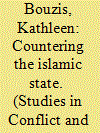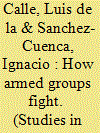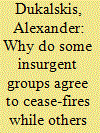| Srl | Item |
| 1 |
ID:
140791


|
|
|
|
|
| Summary/Abstract |
The article explores how the recent quest for local legitimacy in Iraq and Afghanistan has shaped the U.S. military notion of duty toward host citizens. It argues that military duty is conceptualized as a “host-citizen contract.” Based on a qualitative comparison of the 2006 and 2014 versions of FM3-24, the U.S. counterinsurgency field manual, it finds that U.S. forces are obligated to suppress insurgents, build host-nation agency, and protect the host population in exchange for legitimacy. The article's main finding is that the notion of legitimacy has changed in ways that fundamentally limit the scope of duty and justify a breach of contract should the host nation fail to comply.
|
|
|
|
|
|
|
|
|
|
|
|
|
|
|
|
| 2 |
ID:
140793


|
|
|
|
|
| Summary/Abstract |
This research note discusses the tactics and strategies of the United States to counter the Islamic State in Iraq and the Levant (ISIL) from the onset of Operation Inherent Resolve beginning on 8 August 2014 and continuing into early 2015. Through both kinetic and non-kinetic actions, the United States and its coalition has sought to degrade and defeat ISIL. But how effective have these measures been with regard to the group's ability to maintain control over parts of the Iraqi population and territory? ISIL's fast growing affiliate network poses a unique challenge and this study suggests that the kinetic measures of Operation Inherent Resolve have weakened ISIL's tactical capabilities but U.S. efforts to stem the group's recruitment have not been as successful.
|
|
|
|
|
|
|
|
|
|
|
|
|
|
|
|
| 3 |
ID:
140786


|
|
|
|
|
| Summary/Abstract |
This article analyzes the choice of tactics by armed groups. We claim this choice is largely determined by the capacity of the rebel groups to control territory. Groups that are not able to liberate territory remain underground and have to rely mainly on bombings. Groups with territorial control engage in guerrilla-like attacks in which there is a physical encounter with the enemy. This conjecture is tested and largely confirmed at three levels: a cross-sectional analysis of the distribution of tactics in 122 armed groups, using compositional data analysis; a geographical analysis of the distribution of tactics in the largest cities as opposed to the rest of the country; and a case study of Hezbollah.
|
|
|
|
|
|
|
|
|
|
|
|
|
|
|
|
| 4 |
ID:
140788


|
|
|
|
|
| Summary/Abstract |
This article offers a first academic evaluation of the Special Demonstration Squad and the National Public Order Intelligence Unit, two British undercover police units working for the Metropolitan Police Service at different times between 1968 and 2011. It provides a historical overview of their infiltration of political groups involved in protest for the purpose of gathering criminal and political intelligence aimed at preventing violence, public disorder, and subversion. It discusses the controversies surrounding these units, and the related institutional responses, and offers an attempt at understanding their operations within the remit of intelligence-led policing and against a political culture that prioritizes action over inaction in reducing risks and threats to the State and society.
|
|
|
|
|
|
|
|
|
|
|
|
|
|
|
|
| 5 |
ID:
140789


|
|
|
|
|
| Summary/Abstract |
This article uses Burma/Myanmar from 1948 to 2011 as a within-case context to explore why some armed insurgent groups agree to cease-fires while others do not. Analyzing 33 armed groups it finds that longer-lived groups were less likely to agree to cease-fires with the military government between 1989 and 2011. The article uses this within-case variation to understand what characteristics would make an insurgent group more or less likely to agree to a cease-fire. The article identifies four armed groups for more in-depth qualitative analysis to understand the roles of the administration of territory, ideology, and legacies of distrust with the state as drivers of the decision to agree to or reject a cease-fire.
|
|
|
|
|
|
|
|
|
|
|
|
|
|
|
|